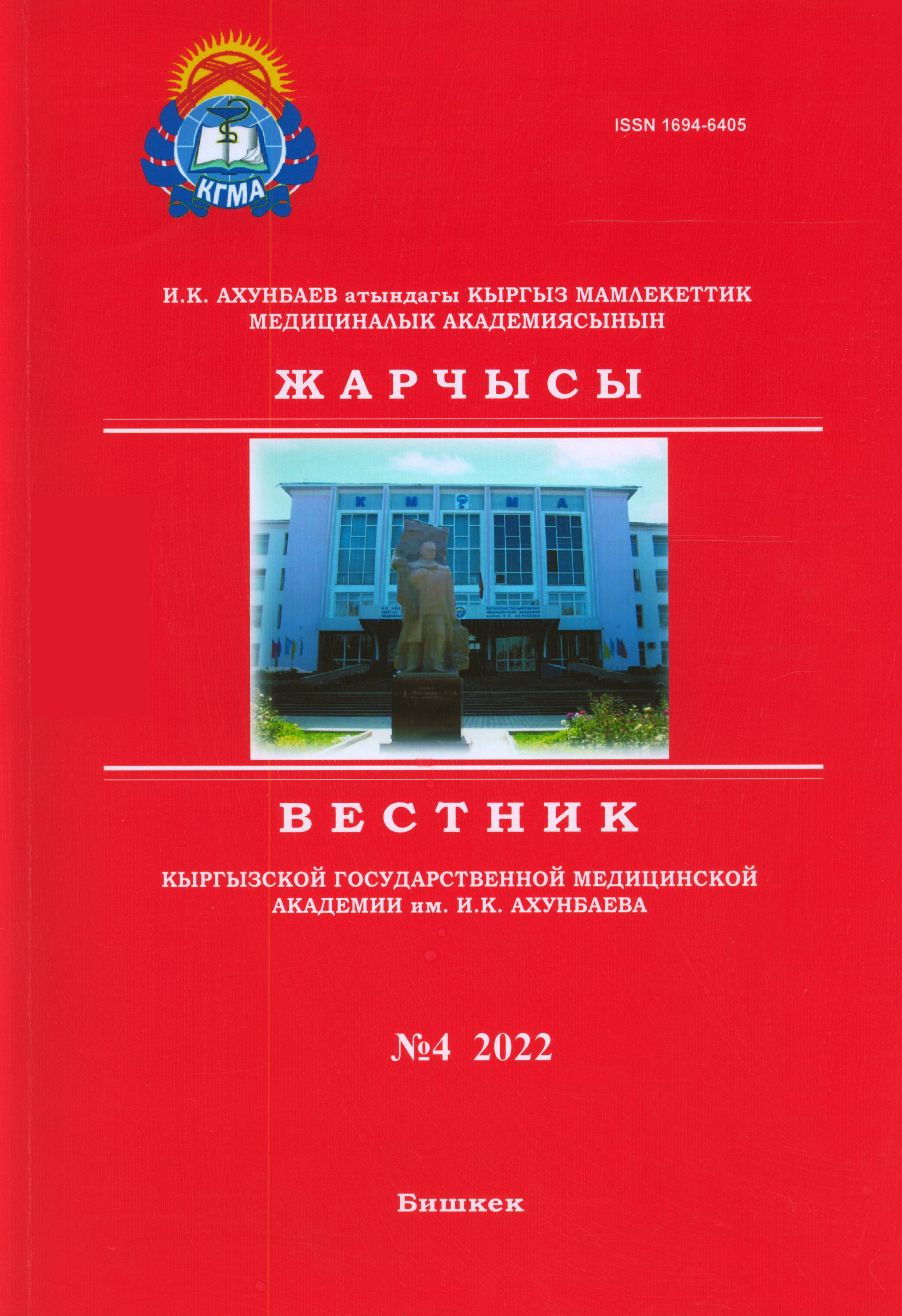БҮТКҮЛ ДҮЙНӨЛҮК САЛАМАТТЫКТЫ САКТОО УЮМУНУН AWARE КЛАССИФИКАЦИЯСЫНА ЫЛАЙЫК АНТИБИОТИКТЕРДИ КОЛДОНУУНУ БААЛОО ЖАНА КЫРГЫЗ РЕСПУБЛИКАСЫНДАГЫ СТАЦИОНАРДЫК ДЕҢГЭЭЛДЕ АЛАРДЫ КЕРЕКТӨӨ БОЮНЧА МААЛЫМАТТАРДЫ ТАЛДОО
DOI:
https://doi.org/10.54890/1694-6405_2022_4_10Аннотация
Корутунду. Антибиотиктерге туруктуулук коркунучун азайтуу үчүн Бүткүл дүйнөлүк саламаттыкты сактоо уюму (ВОЗ) 2017-жылы Access, Watch, Reserve (AWaRe) классификация тутумун киргизген, бул антибиотиктерди алардын туруктуулук потенциалынын негизинде дүйнөлүк керектөө боюнча маалыматтарды чогултуунун маанилүү куралы болуп саналат. Изилдөөнүн максаты – AWaRe классификациясы боюнча Кыргыз Республикасында антибиотиктерди колдонууга салыштырма баа берүү. Материалдар жана изилдөө ыкмалары. AWaRe классификация системасы боюнча антибиотиктерди колдонууну баалоо үчүн ДСУнун 2019-жылга маалымат базасы жана Кыргыз Республикасынын маанилүү дары- дармектеринин бекитилген тизмеси (2018-жыл) колдонулган, мында фармацевтика рыногунда физикалык жеткиликтүүлүгүнө жана Кыргыз Республикасында каттоого басым жасалган. Республика. Жыйынтыктар. AWaRe классификациясына ылайык, жалпы жеткиликтүүлүк категориясы (Access) 48 антибиотикти камтыйт, алардын 20сы ДСУнун маанилүү дары-дармектеринин тизмесине киргизилген, ал эми 18и Кыргыз Республикасынын негизги дары-дармектеринин тизмесине киргизилген, ал эми 16 антибиотик өлкөдө катталган. Watch тобуна кирген 110 антибиотиктин 33ү гана (30,3%) Кыргыз Республикасында катталган, анын ичинен 11и ДСУнун маанилүү дарылардын тизмесине ылайык келет. Кыргыз Республикасынын Маанилүү дары-дармектеринин тизмесине 18 антибиотик кирет, бирок алардын 10у гана ДСУнун маанилүү дарылардын тизмесине туура келет. Резервдик топко 22 антибиотик кирет, анын ичинен 7си ДСУнун маанилүү дарылардын тизмесине киргизилген. Кыргыз Республикасында 3 гана антибиотик каттоодон өткөн, 1 «Кыргыз Республикасынын жашоо үчүн маанилүү дары каражаттарынын тизмесине» киргизилген. Натыйжалар. Антибактериалдык препараттарды рационалдуу колдонуу маселелери өлкө аралык деңгээлде актуалдуу болуп саналат. Улуттук саясатты өзгөртпөстөн, 2023-жылга чейин жеткиликтүү категориядагы антибиотиктерди керектөөнүн жалпы көлөмүнүн кеминде 60% ДСУнун максаты аткарылбайт. Корутундулар. AWaRe системасы антибиотиктерге туруктуулук менен күрөшүү жана өлкөлөр боюнча натыйжалуу антибиотиктерге бирдей жеткиликтүүлүктү камсыз кылуу боюнча күч-аракеттердин маанилүү көрсөткүчү болуп саналат. Кыргыз Республикасында антибиотиктерге туруктуулуктун глобалдык өсүшүнүн шартында антибактериалдык препараттарды сатып алууну жана колдонууну аныктоо үчүн AWaRe системасын киргизүү зарыл. Кыргыз Республикасында негизги дары-дармек каражаттарынын тизмесин кайра карап чыгуу жана антибактериалдык препараттарды каттоо AWaRe (ВОЗ) классификациясынын негизинде жүргүзүлүшү керек.
Ключові слова:
антибиотиктер, антибактериалдык препараттар, башкаруу системасы, антибиотиктерди колдонуунун сапаты, антибиотиктердин классификациясы, Дүйнөлүк саламаттыкты сактоо уюму.Посилання
1. 7th meeting report of WHO advisory group on integrated surveillance of antimicrobial resistance (AGISAR). Geneva: World Health Organization; 2018. Available from: https://apps.who.int/iris/bitstream/handle/10665/272714/WHO-NMH-FOS-FZD-18.1-eng.pdf
2. The State of the World's Antibiotics 2021. A Global Analysis of Antimicrobial Resistance and Its Drivers. The Center for Disease Dynamics, Economics & Policy (CDDEP), Inc. 2021. Available from: https://www.lshtm.ac.uk/research/ centres/amr /news/227421/state-worlds-antibiotics-2021
3. Hsia Y, Lee BR, Versporten A, Yang Y, Bielicki J, Jackson C, PhD et al. Use of the WHO Access, Watch, and Reserve classification to define patterns of hospital antibiotic use (AWaRe): an analysis of paediatric survey data from 56 countries. The Lancet. 2019;7(7):е861-е871. https://doi.org/10.1016/S2214-109X(19)30071-3
4. WHO Model List of Essential Medicines: WHO AWaRe Classification Database of Antibiotics. Date: 2019, Date accessed: April 17, 2020. Available from: https://www.who.int/publications/i/item/WHOEMPIAU2019.11
5. WHO Collaborating Centre for Drug Statistics Methodology. ATC/DDD Index. 2017. Available from: https://www.whocc.no/atc_ddd_index/
6. Klein EY, Milkowska-Shibata M, Tseng KK, Sharland M, Gandra S, Pulcini C et al. Assessment of WHO antibiotic consumption and access targets in 76 countries, 2000–15: an analysis of pharmaceutical sales data. Lancet Infect Dis. 2020. https://doi.org/10.1016/S1473-3099(20)30332-7
7. IQVIA. IQVIA MIDAS. 2000-2015. Available from. https://www.iqvia.com/solutions/Commercialization/geographies/ midas
8. ДЛСиМИ. Перечень жизненно-важных лекарственных средств КР, ПП КР №274 от 06.06.2018. Режим доступа: http://www.pharm.kg/ru/live_important/







